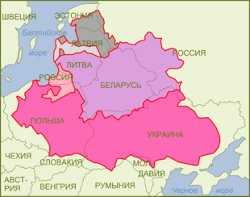As the EU falters a new «empire» could rise in eastern Europe
29- By Przemek Skwirczynski, The Commentator
- 13.09.2012, 14:28

The European Union is undergoing a period of extreme transformation if not collapse, but far from it all being doom and gloom new avenues for international cooperation are opening up.
One pact which seemed firmly consigned to the history books as recently as five years ago suddenly looks like a good idea again. I am referring to the Polish-Lithuanian Commonwealth, originally created over six hundred years ago to counter the threat of a rogue "crusader" state of Teutonic Knights based on the Southern Baltic coast.
For the better part of its 400 year history it constituted one of the largest polities in Europe and encompassed all of today's Lithuania, Belarus, Latvia, as well as the majority of Poland, Ukraine, Estonia and even a small part of Russia.
The Commonwealth occupied the plain to the north and east of the Carpathian Mountains with further natural borders on the Baltic and Black Seas. The main weakness was posed by the lack of natural/defendable borders with Russia to the east and Prussia to the west and north, which eventually led to it being overrun by three military superpowers of the late 18th century: Russia, Prussia and Austria.
Following World War I, an extended version of the Polish-Lithuanian Commonwealth was proposed by Poland and the term“Intermarum” was coined -- the proposal was rejected, which arguably helped the Nazis and Soviets pick the region apart less than two decades later.
At the moment, Poland is housing ever more factories and back offices which produce for or service Western EU countries: mainly Germany where a quarter of all Polish exports end up; whereas the biggest exporters to Poland are Germany and Russia.
It is therefore paramount for Poland that whatever happens to the EU off the back of the Euro disaster, it remains in a trading union with Germany to ensure its exports stay competitive. However, due to the recent outward migrations since Poland's EU accession and the aging of its society, there will soon be a shortage of labour to meet the demands of its economic expansion of recent years. Poland will need to import workers.
One way of tackling this shortfall would be to persuade the Poles who currently live in the former Soviet republics to settle in Poland. Another way would be to open up to Ukraine and Belarus, in order to mimic the way Germany used to suck in workers from Eastern and Southern Europe in the second half of the last century.
Ukraine also happens to have a similarly strong trade relationship with Germany and Russia, and has observer status within the Eurasian Economic Community (a Russian-led organization which strives to be an ex-USSR equivalent to the European Union in terms of providing a common market).
Belarus is a big question mark, akin to North Korea, but a fully-fledged member of the Eurasian Economic Community and certainly a great provider of labour. Definitely, all of these Central Eastern European countries would benefit from being in common markets of the European Union and the Eurasian Economic Community: due to their geographical location, they form a natural bridge between East and West.
However, what also unites Poland and Ukraine is their dependence on Russian gas and the fact that both (especially the latter) have at times been held hostage by Russia turning the gas taps off. It may therefore be something of a twist of fate that these two countries recently learned about the abundance of shale gas on their territories.
It is then no coincidence that they have progressed their shale gas exploration a lot faster than other European countries - in both cases handing out contracts to major players, usually American companies which have already tested their technologies back home in recent years.
Given that, with the exception of Nord Stream (laid on the bed of the Baltic directly from Russia to Germany), all Russian gas pipelines are laid on either Polish or Ukrainian territory a tighter relationship between Poland and Ukraine would strengthen both these countries' bargaining power.
Additionally, all the Baltic States (Lithuania, Latvia and Estonia) also lie on a large shale gas field and their governments have not yet decided against exploration.
Therefore, if the former Polish-Lithuanian Commonwealth countries were to cooperate on the gas front, they could form quite a strong organization, akin to OPEC. They could thus not only influence gas prices in Europe by producing their own gas from shale but also reverse the situation where they were subject to Russian bullying by taking control of its gas pipelines to Western Europe, which are effectively Russia's lifeblood, and by dictating charter fees, hence impacting on that gas's competitiveness within the EU.
Conflict would not be a likely outcome as, by becoming a major gas producer, the "Intermarum" countries would join the same club as Russia anyway, and they would also belong to the Eurasian Economic Community.
From a political perspective, the "Intermarum" would naturally fall into the transatlantic US-UK military sphere, which in turn has always been the core of NATO, of which Poland, Lithuania, Latvia and Estonia are all members, while Ukraine has an Individual Partnership Action Plan.
The problem state from a political point of view is Belarus, but mysterious as the politics of that country are, it is also certain that it is only a matter of time before it has to open up to its neighbours. Of course, as is the case with most areas east of Germany and south east of Austria, local tensions do exist.
Given that the main problem in the region at present is being created by the Lithuanian government towards the Lithuanian Poles, and that in spite of this both countries happily cooperate within the EU and NATO, I think any other issues could also be overcome.
After all, the nations have already lived peacefully together before and there has been a considerable intermixing of all the nations that could be involved in any prospective union. The recent Euro 2012 soccer championship, co-organised by Ukraine and Poland, has also proved that cooperation in the region can work.
To sum up, a slimmed down version of Intermarum has already been tried and tested, and would have lasted for more than the initial 400 or so years of the Polish-Lithuanian Commonwealth, if not for the occupation of its territories by neighbours.
It could create a common front for energy independence and increasing wealth of these nations by exporting gas. It could also open up the European Union market to the countries currently outside of it (Ukraine and Belarus), as well as giving access to the Eurasian Economic Community to the countries which are currently only in the EU (Poland, Lithuania, Latvia, Estonia).
Free movement of workers could help tackle the imminent shortage of labour in Poland and ensure there is no slow-down in its growth. The more mature economies of the Baltics and Poland could provide invaluable expertise to Ukraine and Belarus to help with their transition. With a population of around 100 million and partnerships in Europe and Asia, the Intermarum could be a significant power not only in Europe but also globally.
Przemek Skwirczynski, The Commentator










